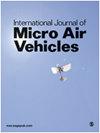双翼悬停扑翼机器人的被动稳定性增强研究
IF 1.6
4区 工程技术
Q2 ENGINEERING, AEROSPACE
引用次数: 7
摘要
悬停扑翼飞行在大多数情况下具有内在的不稳定性,需要主动的飞行稳定机制。本文探讨了增加上下船帆的被动稳定性增强,以及从一个非常简单的模型中解耦俯仰轴和横摇轴来预测稳定性的能力。通过实验对动力学模型中涉及的各种参数进行了计算。其中一个发现是,底部风帆(位于扑翼诱导的气流中)的阻尼系数明显大于顶部风帆。在蜂鸟大小的扑翼机器人上进行了飞行实验,其飞行稳定性的观测结果与动力学模型的预测相吻合。13次飞行试验中有12次与稳定性预测一致。本文章由计算机程序翻译,如有差异,请以英文原文为准。
Passive stability enhancement with sails of a hovering flapping twin-wing robot
Hovering flapping wing flight is intrinsically unstable in most cases and requires active flight stabilization mechanisms. This paper explores the passive stability enhancement with the addition of top and bottom sails, and the capability to predict the stability from a very simple model decoupling the roll and pitch axes. The various parameters involved in the dynamical model are evaluated from experiments. One of the findings is that the damping coefficient of a bottom sail (located in the flow induced by the flapping wings) is significantly larger than that of a top sail. Flight experiments have been conducted on a flapping wing robot of the size of a hummingbird with sails of various sizes and the observations regarding the flight stability correlate quite well with the predictions of the dynamical model. Twelve out of 13 flight experiments are in agreement with stability predictions.
求助全文
通过发布文献求助,成功后即可免费获取论文全文。
去求助
来源期刊

International Journal of Micro Air Vehicles
ENGINEERING, AEROSPACE-
CiteScore
3.00
自引率
7.10%
发文量
13
审稿时长
>12 weeks
期刊介绍:
The role of the International Journal of Micro Air Vehicles is to provide the scientific and engineering community with a peer-reviewed open access journal dedicated to publishing high-quality technical articles summarizing both fundamental and applied research in the area of micro air vehicles.
 求助内容:
求助内容: 应助结果提醒方式:
应助结果提醒方式:


